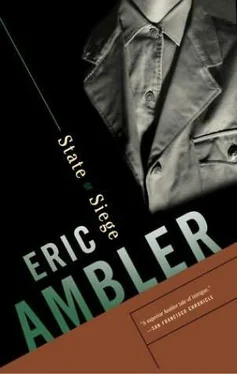Eric Ambler - State of Siege
Здесь есть возможность читать онлайн «Eric Ambler - State of Siege» весь текст электронной книги совершенно бесплатно (целиком полную версию без сокращений). В некоторых случаях можно слушать аудио, скачать через торрент в формате fb2 и присутствует краткое содержание. Год выпуска: 1956, ISBN: 1956, Издательство: Berkley, Жанр: Криминальный детектив, на английском языке. Описание произведения, (предисловие) а так же отзывы посетителей доступны на портале библиотеки ЛибКат.
- Название:State of Siege
- Автор:
- Издательство:Berkley
- Жанр:
- Год:1956
- ISBN:9780425067680
- Рейтинг книги:3 / 5. Голосов: 1
-
Избранное:Добавить в избранное
- Отзывы:
-
Ваша оценка:
- 60
- 1
- 2
- 3
- 4
- 5
State of Siege: краткое содержание, описание и аннотация
Предлагаем к чтению аннотацию, описание, краткое содержание или предисловие (зависит от того, что написал сам автор книги «State of Siege»). Если вы не нашли необходимую информацию о книге — напишите в комментариях, мы постараемся отыскать её.
State of Siege — читать онлайн бесплатно полную книгу (весь текст) целиком
Ниже представлен текст книги, разбитый по страницам. Система сохранения места последней прочитанной страницы, позволяет с удобством читать онлайн бесплатно книгу «State of Siege», без необходимости каждый раз заново искать на чём Вы остановились. Поставьте закладку, и сможете в любой момент перейти на страницу, на которой закончили чтение.
Интервал:
Закладка:
He led me to an office on the third floor at the back of the building. The shell that had burst on the fifth floor had gutted three offices and brought down part of the wall along the corridor, but there had been no casualties, and no structural damage of any consequence. It had short-circuited the lights, however, and Alwi was along there trying to rectify the trouble. I asked him about the generator, but he said that it was running perfectly. By the time I reached Colonel Roda’s office, I was both puzzled and worried.
The office into which the staff captain ushered me had the look of a board room after a directors’ meeting. The air was full of tobacco smoke, and there was a litter of dirty coffee cups and crumpled scribbling paper. There had been seven men in there, but now there were only two: Roda and Aroff. The latter had cleaned himself up and wore a black cap in place of the steel helmet; but he looked even wearier than before. Roda’s face was the colour of putty. It did not seem to have been a very successful meeting.
They were sitting at one end of the table reading through a document and comparing it with what was evidently the draft from which it had been typed. To my surprise, Roda waved me to a chair. I sat down as far away from them as possible and waited. When they had finished, Roda looked at Aroff inquiringly. Aroff nodded, but with the air of a man agreeing to something against his better judgment. Roda pursed his lips and turned to me.
“Mr. Fraser, we have sent for you because we believe that you may be willing to assist us.”
“Oh yes?”
“The General and I were much impressed by your co-operation in the matter of the generator. Under circumstances of the greatest difficulty, without proper assistance or equipment, you employed your skill and knowledge to such good effect that the enemy’s attempts to silence Radio Sunda were totally defeated.” He smiled.
This was fantastic. For one wild moment I thought that he was about to pin a decoration on me: the Order of Boeng Sanusi (2nd Class) perhaps. I smiled back guardedly. Aroff, I noticed, was absently studying his fingernails, as if none of what was being said were any business of his.
“That being so,” Roda continued amiably, “we do not think it unreasonable to assume that, as a British friend of Sunda, you are sympathetic to the policy and aspirations of the National Freedom Party and its leader.”
I could have thought of several brief replies to that, but by now I was curious to know what he wanted.
I shook my head doubtfully. “As a foreigner, of course, it would be a gross impertinence for me to express an opinion about a political matter.”
“Nevertheless, Mr. Fraser, we feel that you are not unsympathetic to the principles for which we stand. It is for that reason that we propose to take you into our confidence.”
“I see.” I did not see, but he evidently expected me to say something.
“Good. As you know, the Nasjah forces have counter-attacked. At this moment a battle is being fought in the streets of our city. Now, I must tell you, Mr. Fraser, that but for the activities of certain enemy agents and the unconstitutional action of the Nasjah gang in arresting many of our supporters on false charges, this battle would not be going on. We should be in complete control. As it is, Sunda is faced not merely by civil war, but also by the devastation of large areas of our capital. Mr. Fraser, we are patriots, not savages. Sunda cannot tolerate civil war. Selampang cannot be permitted to suffer needlessly. General Sanusi has, therefore, taken the initiative in proposing to General Ishak, as between equals, an armistice, during which negotiations can take place for the evacuation of all armed forces from the city and the setting up of a joint commission of conciliation under neutral supervision.”
It was not a bad bluff. If I had not talked to Suparto I might have swallowed it for a while. I glanced at Aroff. He had a knife out and was cleaning his fingernails now. I looked back at Roda.
“I wish you every success, Colonel. But I don’t see how I can help you.”
“I will explain, Mr. Fraser. We have been in telephone communication with General Ishak’s headquarters and certain conditions have been agreed for a preliminary meeting to discuss the terms of the cease-fire. That meeting will take place, under flags of truce, in front of the police barracks at four o’clock. That is in half an hour.” He paused and stirred uncomfortably.
“Yes, Colonel?”
“We asked that independent foreign observers should be present, so that any promises made or undertakings given should be properly witnessed. Consular or diplomatic representatives would have been suitable, but this was not agreed. The enemy refuse to permit accredited representatives of foreign powers to participate in what they say is a domestic political matter. They pretend that it would be contrary to protocol and an encroachment on our national sovereignty. In fact, of course, they are afraid to lose face. It has been agreed, however, that two foreign observers not of diplomatic status may attend, one for each side, providing that neither is a newspaper representative and neither of Dutch nationality. We would like you to attend for us, Mr. Fraser.”
“Me? Why me? Surely there is someone more suitable in the area you control, some business man who fulfils the agreed conditions.”
“There may be, Mr. Fraser, but we do not know where to find him at this moment. There is not much time.”
“Frankly, I don’t see why you need anyone at all.” This was pure malice. I did see. Having nothing whatsoever to offer in exchange for the terms he was asking, and merely hoping to pull off a bluff, he was doing his best to make the negotiations seem formal and portentous. If the other side were the slightest bit unsure of themselves, it was just possible, too, that the presence of neutral observers might influence their judgment.
“The procedure has been agreed,” he said coldly. He was tired of persuasion, and the fact that he would sooner be cutting my throat than asking for my co-operation was beginning to show in his eyes.
“Very well. What do I do?”
“Colonel Aroff will be our delegate. You will accompany him.”
“What are my duties?”
“Firstly, to take note of what is said.” He hesitated. “Should you feel, of course, that the other side are not viewing the situation correctly, you would be entitled to consult with their observer, and perhaps to protest.” His eyes held mine. “I am sure you realise, Mr. Fraser, that it is in everyone’s interest that an acceptable agreement is reached.”
There was sufficient emphasis on the word “everyone.” I understood now.
“May I know what terms you would accept?”
“Colonel Aroff has his instructions. He will explain them to you on the way. You should be leaving now.”
Colonel Aroff put his knife away, stuffed the document they had been studying into his pocket and stood up. Then, with a nod to me he walked out of the room. He did not even look at Roda.
The staff captain was waiting in the corridor and, as I followed Aroff out, he joined the procession. I noticed that he was carrying something that looked like a long cardboard tube in his hand. We followed Aroff down the stairs to the sandbagged entrance. There was a guard there who demanded passes before we were allowed to leave the building; Suparto having got away, the stable door was now bolted. The staff captain had the passes and we went through.
Outside in the road there was a jeep waiting which I recognised as the one from Tangga that Suparto had used. There was a soldier sitting in the driving seat. Aroff stopped and looked at the tube the staff captain was holding.
“Is that the flag of truce?”
Читать дальшеИнтервал:
Закладка:
Похожие книги на «State of Siege»
Представляем Вашему вниманию похожие книги на «State of Siege» списком для выбора. Мы отобрали схожую по названию и смыслу литературу в надежде предоставить читателям больше вариантов отыскать новые, интересные, ещё непрочитанные произведения.
Обсуждение, отзывы о книге «State of Siege» и просто собственные мнения читателей. Оставьте ваши комментарии, напишите, что Вы думаете о произведении, его смысле или главных героях. Укажите что конкретно понравилось, а что нет, и почему Вы так считаете.












